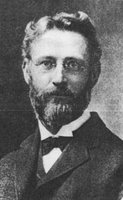
Today starts a two-part summary of Vos's biblical theology*:
• The study of God is something encouraged by God, and this is evident by His gift to us of His word. God's eternal purpose to know and be known covenantally by His creatures is revealed in His word, and from this we recognize that the Scripture's revelation of God is the foremost means by which this purpose is realized. It behooves us, then, to see the Bible as God's love letter to His people, a living document in which He discloses Himself. The Bible itself is a condescention on God's part, a grace, a show of favor. Thus, a covenantal approach to Scripture will yield peculiar insights as opposed to a systematic approach. Essentially Biblical Theology adopts God's system, and attempts to conform our understanding of God to God's calculated historical revelation of Himself.
• It is the knowledge of God, the heavenly foretaste of things to come, which enlightens man to himself and to creation around him.
• Essentially all theology is exegetical. There is no true knowledge of God apart from His word. Because the Bible is the source of human knowledge of God, it becomes imperative to make the Bible's own method of revelation our own foundation for formulating theology. Theology is the knowledge of God which God Himself has afforded to His covenant people in His self-disclosure. With this understanding, the study of theology cannot be infringed by the study of religion, which is essentially the study of the creature.
• Biblical Theology is not the study of the Bible, but the study of God as revealed in the Bible.
• God's own method of Self-revelation is supremely and perfectly logical. For it is the logos of infallible God which becomes our standard, not the logos of fallible man. Systematic theology, then, must submit to Biblical theology and formulate its science accordingly. The Bible is arranged not according to axiom but according to history. Good and necessary consequence, the sytematician's trade, must be informed by the theology of God's word, or else it fails in its task and cannot live up to its name. John Murray has pointed out that systematic theology views revelation as a finished whole, while biblical theology views revelation as organic process.
• Because the Bible is a living book, it alone among books accomodates its readers in every class, culture, time, and place. Failure to treat the Bible as "alive and powerful," leads to a perceived gap in culture and history which needs to be bridged by gleaning eternal principles from the text in order to make it relevant. The text itself is relevant by virtue of its nature as Qeo/pnuestoj(Theopnuestos). The Bible actively reaches out to include you. We stand in the same place with the Apostles, namely the semi-eschatological age of fulfillment, looking back at the cross and resurrection and seeing the culmination of God's revelation in Christ. We have been brought into that same wonder-world of redemption which Peter, John, and Paul found themselves in; and that world now compels us in our many stations and positions. It is the air we breathe.
• God has chosen history to be the vehicle of His Selfrevelation, and His Self-revelation is accomplished in the supernatural acts of redemption. This is God's prerogative as sovereign Lord of His creation. God reveals Himself to man as their Redeemer. Redemption for historical beings (man) must take the shape of a historical progress. Redemption cannot be separated from history, and history is the chronicle of God, the Author of history's, accomplishment of that eternal purpose. When history will have achieved that end to which it was brought into existence, it will pass out of existence. Special revelation is historical because redemption is historical if for no other reason than that the redeemed are historical beings.
• A key to Vosian Biblical Theology is the recognition of events as revelatory and prophetic. OT events, like OT prophesy, look for fulfillment, and they find fulfillment in Christ. The redemptive acts of God are patterned after the consummate redemption of Jesus Christ, and as such serve as prophesies of that eschatological act. Like prophesy, those events are sketchy and dim and can only be interpreted in light of the finished work of Christ and the Kingdom of God which His ministry inaugurates. God reveals Himself as the One who declares the end from the beginning, and He does so from the beginning of His revelation. The closer the consummation of history draws, the more evident God's purpose for history becomes, and we recognize in earlier revelation in often less distinguishable types the presence of the end.
* All excerpts from www.two-age.org




No comments:
Post a Comment